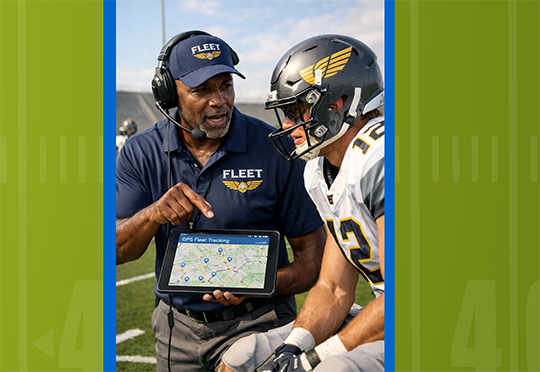
What's the Cost of Not Using GPS Tracking?
Successful fleet management hinges on using company resources as effectively as possible.
Where commercial vehicles are concerned, that means keeping up with preventative maintenance, avoiding deadhead miles and keeping fuel costs at a minimum — all of which rely on knowing where your vehicles are located, and what kind of shape they’re in.
That’s the main conceit of GPS fleet tracking solutions (or other useful all-in-one tools equipped with GPS fleet tracking); they give an accurate lay of the land when creating your business’ game plan while minimizing the risk of costly miscommunication.
As you can imagine, there are several ways a good GPS tool can affect fleet management:
Using GPS fleet tracking saves on fuel
Fuel is expensive, it turns out. Cutting down on unnecessary mileage and wasted fuel requires data, which will be hard to get (and even harder to optimize) without GPS tracking. Even a tiny percentage of fuel saved on each route can make a sizable difference — not to mention the secondhand benefit of dissuading drivers from taking any unauthorized side trips.
GPS fleet trackers make bookkeeping much simpler
Manual data entry tends to be time-consuming and prone to error (particularly for those relaying drop-off details from memory days after a job). Unless someone driving for your company desperately enjoys completing mileage reports by hand, automating this aspect of your business will make for more accurate bookkeeping — and frankly it’s unlikely to be met with any complaint.
GPS fleet tracking tools can optimize driver schedules
The term “suboptimal” can sometimes sound a little overly-analytical, but you might see why the phrase “dispatching without knowing where anybody is located is a huge big nightmare for everyone involved” has a harder time catching on.
Scheduling, route-planning, and dispatching without real-time GPS fleet tracking is indeed suboptimal, often leading to unnecessarily tight deadlines and hindering drivers’ ability to take on and complete additional jobs.
The benefits of using GPS fleet tracking
So; improved efficiency, lower costs, these are undeniable positives for your business — but those are still only the high-level advantages.
In practice, it’s also much easier for customers to receive accurate ETAs and status updates when you have a beat on their shipments’ real-time tracking data.
This introduces the dual-benefits of:
- Reducing the chances a driver misses a drop-off appointment.
- Making customers like you a lot more, both of which tend to be good for business.
Disputes can also be handled more easily with timestamped data, as opposed to relying on notes or retracing one’s steps by memory. Likewise, assigning an urgent job to a driver already in the area becomes a simple matter of pulling GPS info instead of initiating a game of phone-tag.
GPS fleet tracking tools even contribute to good training practices; good driving can be recognized and rewarded, while dangerous driving habits can be mitigated and ultimately eliminated. Through the countless day-to-day difficulties associated with keeping tabs on your drivers and vehicles, few tools are as impactful as a GPS fleet trackers.
Linxup’s fleet visibility solution (yes, it’s a GPS fleet tracking solution)
Ready to see how Linxup GPS fleet tracking fits into your workflow? Explore our GPS fleet tracking solutions to discover how affordable, powerful, and easy-to-use fleet tracking can be (oh, and don’t forget to check out more great fleet management info on our blog).



